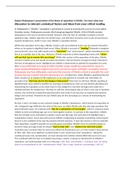Explore Shakespeare’s presentation of the theme of reputation in Othello. You must relate your
discussion to relevant contextual factors and ideas from your critical reading.
In Shakespeare’s “Othello,” reputation is presented as crucial to ensuring the success of a man within
Venetian society. Shakespeare presents this through protagonist Othello. At first Othello remains
obsequious in the way he presents himself, however when his fear of cuckoldry is played on by the
egotistical Iago, Othello regresses into bestial ways, and therefore becomes more crude and pernicious
towards Desdemona, which in turn ruins Othello’s reputation further.
Within the exposition of the play, Othello remains calm and collected in the way he presents himself to
others as he speaks in dignified blank verse. When Othello is accused of “stealing” Brabantio’s daughter
away from him, he is met with insults such as “foul thief” and “sooty bosom”, which immediately brand
him as an outsider due to his race. However, Othello responds to these degrading insults with “where
will you that I go to answer this you charge” Within this section of the exposition of the play, Othello
remains in blank-verse and speaks in iambic pentameter, the fact that he manages to keep collected in
the face of derogatory insults, highlights how Othello is determined to uphold his reputation for some
time. A successful black army general within Venetian society would have subverted the views of a
typical Jacobean/Elizabethan audience due to the uncommon nature of Othello’s occupation, however,
Shakespeare may have deliberately constructed the character of Othello as black to exemplify the racial
tensions that were present during the Renaissance era. Furthermore, when Othello is questioned by the
Duke, he goes on to explain his life experience as an army general in constant war and battle, he
proclaims that “she loves me for the dangers I had passed” Note that we still hear Othello speaking in
dignified bank-verse whilst he justifies his marriage to Desdemona. Here we see Othello upholding and
maintaining his reputation as he insists that it is the dangers he has been through that made him a
suitable bachelor for Desdemona. This links in with the stereotypical idea of what a man was in Venetian
society. One would be considered hypermasculine and manly if one has seen or experienced extreme
danger and survived. Therefore we see Othello play on this stereotype as a means of maintaining his
reputation.
By Acts 3 and 4, we begin to see a pivotal change in Othello’s demeanour, which leaves his reputation at
risk. Antagonist Iago infiltrates the mind of the moor, as when Othello asks him why Iago questions him
about Michael Cassio, he responds with “But for a satisfaction of my thought”, which in response leads
Othello to echo everything Iago says in an interrogative manner. In contrast to the exposition, Othello
falls out of blank verse and begins to speak in prose just like Iago. Not only does this highlight Iago’s
manipulative nature, but it also portrays how Othello is beginning to question everything, enforcing the
idea he is not confident in the way he presents himself anymore. A man who wants or aims to maintain
their reputation, wouldn’t question or second guess everything. Othello’s fear of cuckoldry begins to
become reality and Iago states he should “look to [his] wife” and “observe her well with Cassio”
Cuckoldry was a common fear for most men within the Renaissance era, as if one couldn’t keep control
of their wife, they were labelled a cuckold which in turn would stain their reputations. Taking this
contextual factor into consideration, we have already seen Othello viewed differently due to his race.
This combined with this fear of cuckoldry becoming a reality, could prove detrimental to Othello’s
reputation, and unfortunately later on in the play. Critic Muir calls Othello a “credulous fool” for being
able to be manipulated by the “melodramatic villain” that is Iago, however contrastingly, Critic A.C





